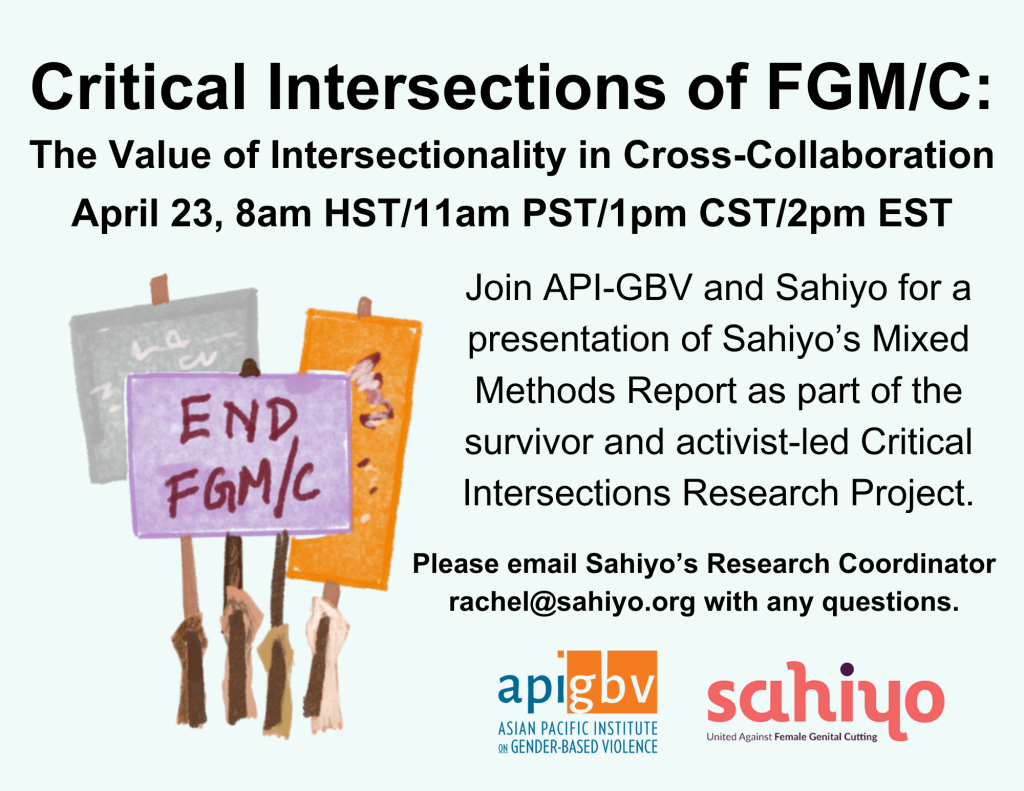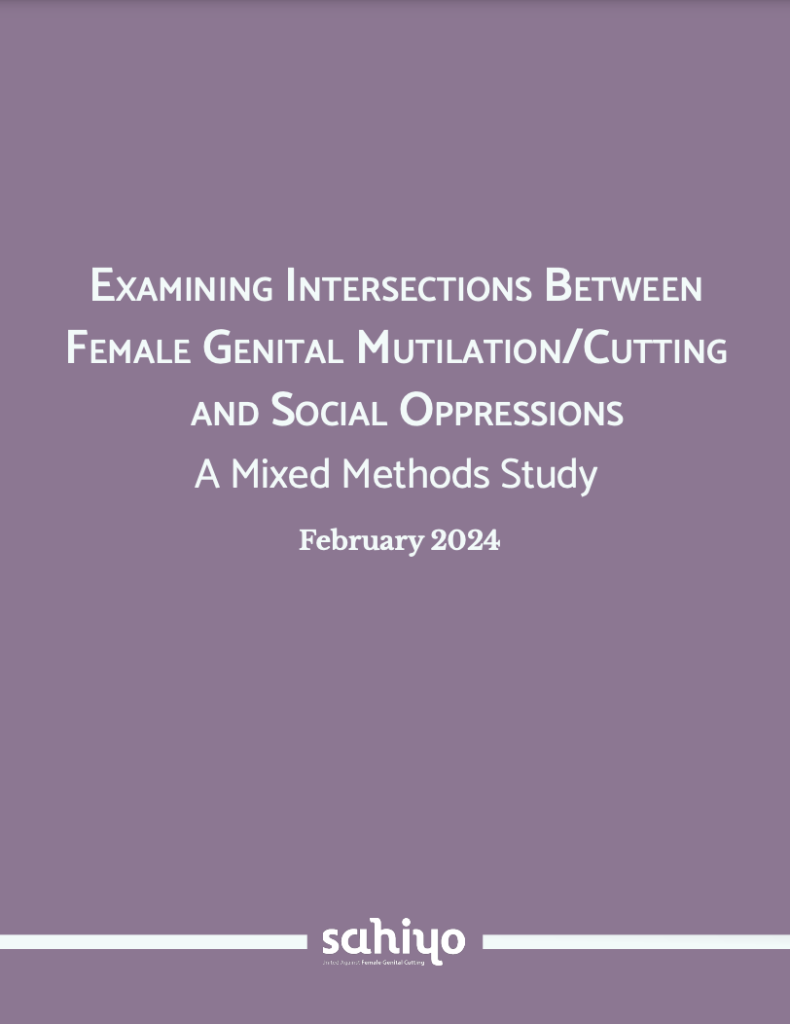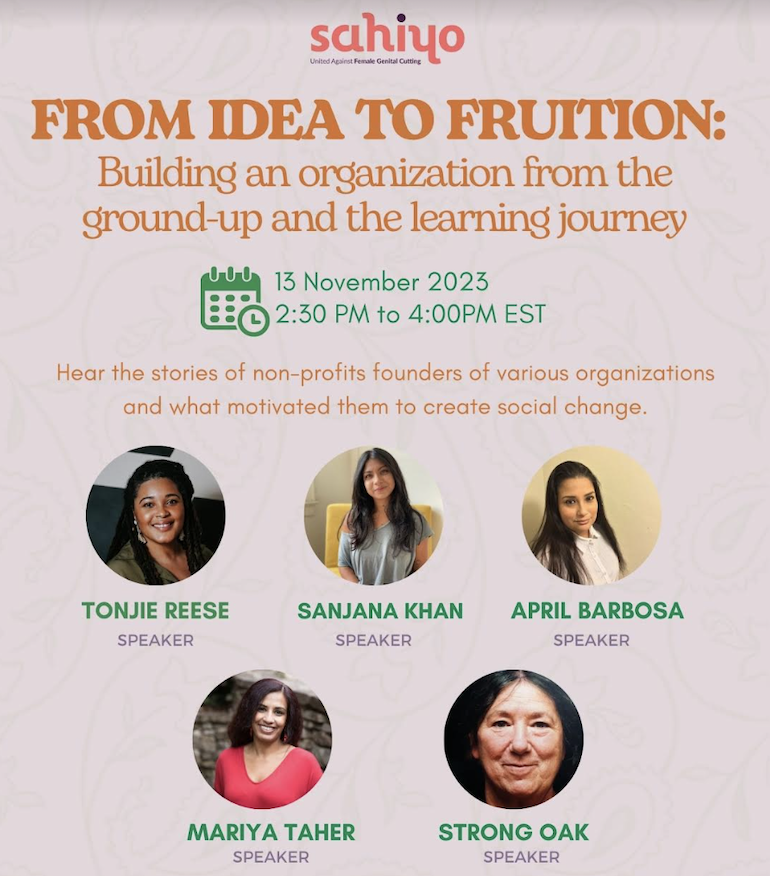Critical Intersections of FGM/C: The Value of Intersectionality in Cross-Collaboration Webinar

Sahiyo is excited to announce an upcoming event tied to our survivor and advocate-led Critical Intersections Research Project! This original research, which has been in development for over two years, examines the issue of female genital mutilation/cutting (FGM/C) through an intersectional lens. This includes an analysis of media on the topic (published in our first report), as well as data from a mixed-methods survey (published in our second report) and in-depth qualitative interviews (to be published later in 2024). The project seeks to understand both challenges that FGM/C survivors and activists face, as well as opportunities for cross-sector collaboration with other social justice movements. Critical Intersections of FGM/C: The Value of Intersectionality in Cross-Collaboration, hosted by API-GBV, will focus on collaborative aspects of social justice work. In hopes of facilitating meaningful discussion around cross-sector collaboration and intersectional programming, this presentation shares challenges and opportunities to collaborative projects found in our research, with plenty of time for feedback and weigh in from the audience. Because turning data into action is the goal, and Sahiyo continues its exploration on this topic, we hope to expand our understanding with the insights of activists, frontline professionals, and other attendees of this event. Event Date: April 23rd Event Time: 2:00-3:30 PM EST Registration: https://us02web.zoom.us/meeting/register/tZModOypqT0qG9BpxXwUcL_lIiFmUOSP_l49#/registration
Sahiyo releases new research report on February 6th

Sahiyo U.S. is excited to announce the publication of Examining Intersections Between Female Genital Mutilation/Cutting And Social Oppressions: A Mixed Methods Study, the second of three reports from our Critical Intersections Research Project. Inspired by our 2021 webinar, and building upon themes derived from our initial body of work released in 2023, this new report is based on original research from a mixed-methods survey with over 100 respondents, including individuals and organization that work within and beyond the FGM/C sphere. We are proud to share this report on February 6th, International Day of Zero Tolerance for FGM/C, as part of our survivor and advocate-led original research project. The report examines two main forms of oppressions intersecting with FGM/C: systemic forces, including discrimination within institutions, as well as interpersonal and communcal factors, such as discrimination within practicing communities and the anti-FGM/C movement itself. This body of work also identifies challenges and opportunities for cross-collaboration with other social justice movements and provides recommendations for how to implement this intersectional work. This research is meant to support advocates working in FGM/C to better understand how these intersecting oppressions affect the movement to end FGM/C, and connect fellow activists and social change makers to understand the larger forms of inequity at play and unite in ending these universally oppressive systems. We aim to strengthen anti-FGM/C efforts by addressing the roots of inequity and inequality and to create stronger collaborative movements across various human rights issues. Read the report here. Learn more about the Critical Intersections Research Project here.
Sahiyo publishes second report from Critical Intersections Research Project

Sahiyo U.S. is excited to announce the publication of Examining Intersections Between Female Genital Mutilation/Cutting And Social Oppressions: A Mixed Methods Study, the second of three reports from our Critical Intersections Research Project. Inspired by our 2021 webinar, and building upon themes derived from our initial body of work released in 2023, this new report is based on original research from a mixed-methods survey with over 100 respondents, including individuals and organization working within and beyond the FGM/C sphere. We are proud to publish this report, as part of a survivor and advocate-led original research project, on February 6th, International Day of Zero Tolerance for FGM/C. The report examines two main forms of oppressions intersecting with FGM/C: Systemic forces, such as discrimination within systems and institutions, included intersections between several forms of oppression such as xenophobia and racism with institutions like law enforcement. Many survey participants identified fear of the criminal justice system as a challenge for survivors and the end FGM/C movement; interestingly, a majority of every group reported to work with the legal system and law enforcement (in and beyond the FGM/C sphere). Interpersonal and communal forces, such as discrimination from within practicing communities and the movement to end FGM/C, introduced complexities for survivors and activists alike. Interestingly, individuals working in the FGM/C sphere most commonly identified interpersonal challenges (rather than systemic forces) such as gender discrimination and other forms of gender-based violence as challenges that girls and women in FGM/C-practicing communities face. Additonally, a strong discord around the framing of FGM/C (‘mutilation’ vs. ‘cutting’) suggested a significant barrier to collaborating within the FGM/C sphere and beyond. Lastly, the study examined the potential for cross-collaboration between the anti-FGM/C sphere and other social justice movements. Though participants reported an overwhelming desire for cross-collaboration across the demographic groups, they also identified many significant challenges for meaningful cross-collaboration. Participants also provided opportunities for collaboration. From the various challenges, opportunities, and intersections of oppressions, eight recommendations for cross-sector collaboration and intersectional work involving how to work toward ending FGM/C were gathered. This research is meant to support advocates working in FGM/C to better understand how these intersecting oppressions affect the movement to end FGM/C, and connect fellow activists and social change makers to understand the larger forms of inequity at play and unite in ending these universally oppressive systems. We aim to strengthen anti-FGM/C efforts by addressing the roots of inequity and inequality and creating stronger collaborative movements across various human rights issues. A special thank you to the Wallace Global Fund for funding this project! Read the full report here.
From idea to fruition: A webinar by nonprofit founders working in gender-based violence

Starting an organization is by no means an easy feat, even when someone is passionate about a topic, there will always be stumbles along the way to developing an organization. These falls of Mariya Taher, cofounder of Sahiyo, are what led her to look for opportunities for support, like with the Valor LEAP fellowship program. The LEAP program is designed to provide an intensive, interactive training and practicum for leaders of color in the anti-violence field. With encouragement from the LEAP program, Mariya organized this webinar on November 13th to support others who have ideas and interests in starting a social justice-oriented organization. Founders from across the VALOR LEAP Cohorts, including Strong Oak Lefebvre, Sanjana Khan, Tonjie Reese, and April Barbosa joined Mariya for a discussion on what led them to found their organizations and the lessons, challenges, and successes that they have encountered along the way.
